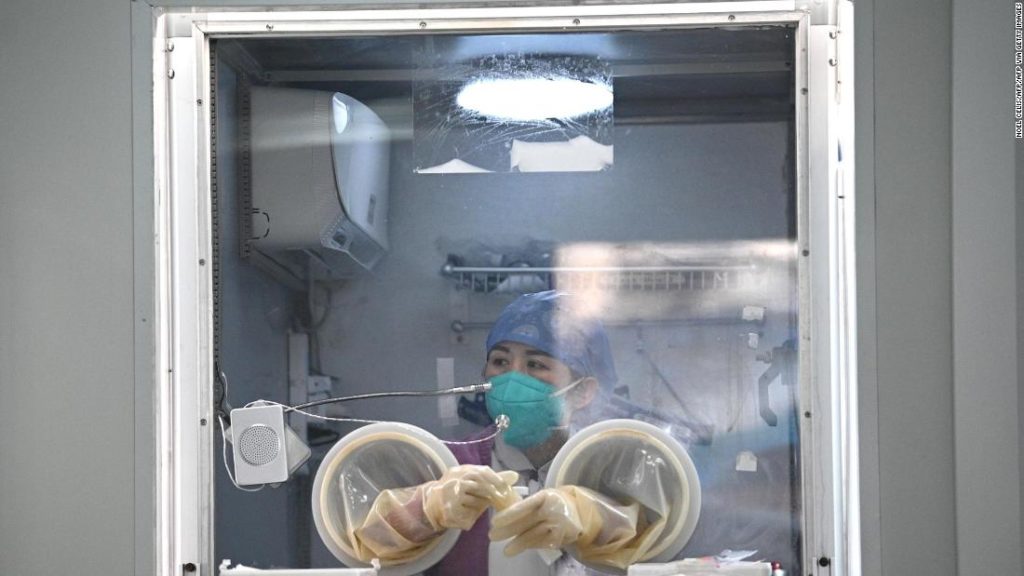The leading US military germ lab,
Fort Detrick briefly became a
trending topic on Chinese social media after Hua’s comments, which were heavily promoted online by the Communist Youth League, among other Party and state-backed accounts. Previously, Chinese officials have suggested — without evidence — that even if the pandemic did originate in Wuhan, the coronavirus could have been brought to the city by US soldiers
taking part in the Military World Games in October 2019.
Beijing has also pushed the idea that the virus could have entered the country on frozen food or other goods, despite most outside researchers
disputing claims that it could be easily spread this way.
Asked by CNN about her Fort Detrick comments,
Hua claimed there was evidence that “the epidemic broke out in multiple places earlier in the autumn of 2019 and there might be links between the seasonal influenza in the US and the epidemic,” adding that it was “not for China, but for the US, to offer the answers.”
Claims that the
pandemic had “multiple origins” have not been supported by most scientists, and even if true, do not change the fact that the Chinese city of Wuhan was where the first major outbreak occurred, and where local officials were found to have downplayed the danger, allowing the virus to spread.
Wuhan remains the most likely origin of the pandemic itself, providing scientists with important data about how the virus evolved and what lessons we could draw from this for the future.
After months of delays and diplomatic wrangling, a WHO research team
arrived in the city earlier this month to begin an investigation, bringing with them additional scrutiny, which seems to have prompted the sudden resurgence of the Fort Detrick conspiracies.
The WHO team has already said that they have no intention of assigning blame, nor is it necessarily their job to do so. However, any suggestion of uncertainty about the origins of the pandemic, or how the virus first began spreading,
will likely be seized upon by Beijing to reinforce the alternative theories state media is already advancing.
New outbreaks of the virus in China itself, after months of having largely got the pandemic under control, also add to the urgency of deflecting blame outwards, particularly as cities are plunged back into lockdown and potential economic misery.
Xi has repeatedly emphasized the success of the Chinese Communist Party in tackling the pandemic, an achievement that is all the more striking when compared with the US and much of western Europe. As it rolls out
vaccines both domestically and internationally, the chance of turning the coronavirus from a reputational disaster into a propaganda win must be all the more alluring.
But the promotion of vaccine disinformation could have major repercussions, not only in the US but also in China.
On Monday, Global Times, the state-backed tabloid which has led the charge on attacking the Pfizer and Moderna mRNA-based vaccines, used the death of a single patient in California to claim without evidence that the shots were dangerous. Health experts have said repeatedly that deaths will occur after vaccination — especially in the early stages, when most people inoculated are elderly and sick — but this does not mean they were caused by the shot itself.
Global Times even cited health authorities in Placer county, who it said reject “the link between the person’s death and the vaccine.” But this did not stop the paper using this as a peg to quote anonymous Chinese experts claiming mRNA shots were dangerous and “may contain unknown risks.”
This reporting goes beyond attacking the specific Pfizer shot too, suggesting that the technology used to develop the newer mRNA vaccines is itself untrustworthy — a claim that has no substance and could have repercussions for future Chinese products as well as the existing Pfizer/Moderna shots.
Such reports are having an effect. Last week, Philippine President Rodrigo Duterte pointed to reports —
heavily promoted by Chinese officials and state media — of deaths in Norway, where the Pfizer vaccine is being distributed. Norwegian health authorities have said there was
no correlation between receiving the Pfizer vaccine and increased risk of death among the 23 deceased patients who had previously received the shot.
“Almost everybody that I know is scrambling to buy this Pfizer (vaccine),” Duterte said in
addressing calls from some lawmakers to prioritize the US manufacturer’s shots over Chinese vaccines. “If you want to follow the experience of Norway, go ahead. Nobody would stop you.”
His comments were quickly picked up
by Chinese media, feeding another round of disinformation.
Writing this week, Yanzhong Huang, senior fellow for global health at the Council on Foreign Relations, said that China’s success in tackling the pandemic at home may have left the country with a false sense of security when it comes to vaccines. Huang cited polling data showing that a surprising number of Chinese respondents cited “not being enough at risk from Covid-19” as a reason to refuse taking a shot, an unusual result even in countries where vaccine hesitancy is far more widespread than in China.
Similar sentiment could be behind the Chinese government’s willingness to play fast and loose with vaccine misinformation. China has among the least vaccine hesitant populations in the world,
according to a recent Nature study, and even if skepticism were to increase, the ability of an authoritarian state to force mass inoculation is not in doubt.
But as Xi himself noted Monday, vaccines are vital to the global pandemic response, indeed, this is why Beijing has invested in providing inoculations to developing countries. But such an effort will be undermined if, along with vaccines, China is also exporting misinformation and hesitancy.

